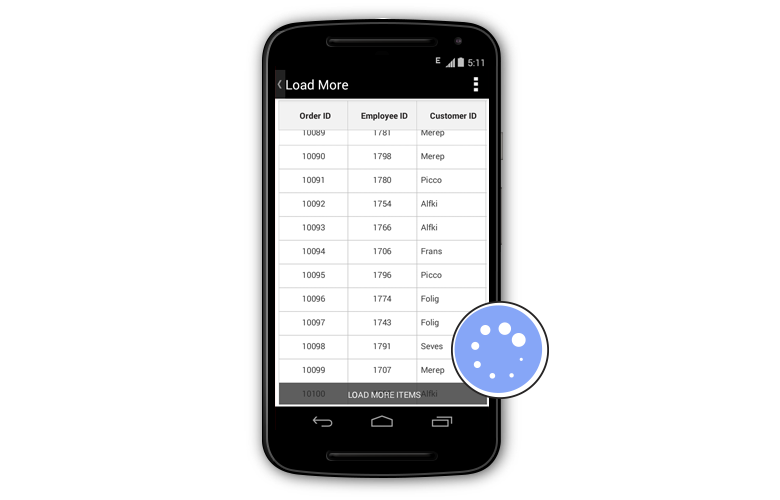How can I help you?
Load More in Xamarin.Android DataGrid (SfDataGrid)
8 Jul 20215 minutes to read
The data grid enables the LoadMore option by setting the SfDataGrid.AllowLoadMore property to true and by setting the SfDataGrid.LoadMoreCommand property. When the LoadMore is enabled, the control provides the option to load a subset of data to its data source at runtime using the LoadMoreView.
On scrolling down, when the grid reaches the maximum offset, an interactive load-more view is displayed in the view. Tapping the load-more view triggers a command to add more data to the data source of the grid at runtime.
LoadMoreCommand
The data grid load records to its data source at runtime by triggering an ICommand bound to the SfDataGrid.LoadMoreCommand property. When tapping the load more view, if the CanExecute of the ICommand returns true, this command is triggered to load the records at runtime.
Set the SfDataGrid.IsBusy property to true before loading items. This notifies the grid that more items are being loaded to it. Set the property to false after loading items to the grid. When loading items, you can also alter the timing for the LoadMore animation from the sample by setting a delay.
The following code example illustrates how to enable and load items at runtime:
//Enable load more in the data grid
dataGrid.AllowLoadMore = true;
dataGrid.LoadMoreCommand = new Command(ExecuteLoadMoreCommand);
private async void ExecuteLoadMoreCommand()
{
this.dataGrid.IsBusy = true;
await Task.Delay(new TimeSpan(0, 0, 5));
viewModel.LoadMoreItems ();
this.dataGrid.IsBusy = false;
}
//ViewModel.cs
internal void LoadMoreItems()
{
for (int i = 0; i < 20; i++)
this.OrdersInfo.Add(order.GenerateOrder(OrdersInfo.Count + 1));
}
//Command.cs
public class Command : ICommand
{
private Action execute;
private bool canExecute = true;
public event EventHandler CanExecuteChanged;
public Command(Action action)
{
execute = action;
}
public bool CanExecute(object parameter)
{
return canExecute;
}
public void Execute(object parameter)
{
changeCanExecute(true);
execute.Invoke();
}
private void changeCanExecute(bool canExecute)
{
this.canExecute = canExecute;
if (CanExecuteChanged != null)
CanExecuteChanged(this, new EventArgs());
}
}Customize load-more display text
Customize the text displayed in the LoadMoreView by setting the SfDataGrid.LoadMoreText property as follows:
//setting load more text in the data grid
dataGrid.LoadMoreText = "Load More Items";Customize load-more view position
Customize the position in which the LoadMoreView is displayed to either top or bottom.
//Enable load more in SfDataGrid
dataGrid.LoadMorePosition = LoadMoreViewPosition.Bottom;Customize load-more view
The data grid also customizes the LoadMoreView by writing your custom LoadMoreView class inheriting from the LoadMoreView, and performing the LoadMoreOperation.
The following code example illustrates how to customize the LoadMoreView in the data grid:
public class CustomLoadMoreView : LoadMoreView
{
private Button loadMoreView;
public CustomLoadMoreView()
{
this.BackgroundColor = Color.Red;
loadMoreView = new Button ();
loadMoreView.Text = "LoadItems";
this.Children.Add(loadMoreView);
loadMoreView.Clicked += loadMoreView_Tapped;
}
void loadMoreView_Tapped (object sender, EventArgs e)
{
if (this.LoadMoreCommand != null)
{
this.LoadMoreCommand.Execute(null);
}
}
protected override void LayoutChildren(double x, double y, double width, double height)
{
loadMoreView.Layout(new Rectangle(x, y, width, height));
}
}Running the application renders the following output:
